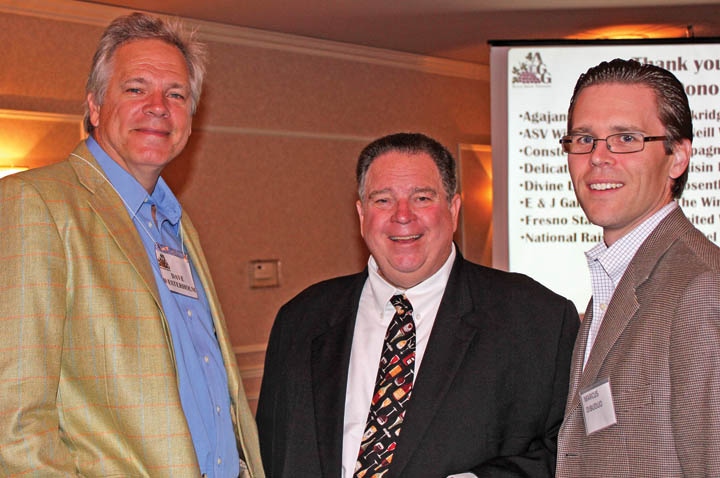July 19, 2012

Allied Grape Growers, headquartered in Fresno, could be poised for its highest sales revenue in 15 years, possibly pushing above the $100 million mark in gross returns from this year’s crop of wine grapes.
That observation by Nat DiBuduo, president and CEO of Allied, was a highlight of the group’s 61st annual meeting in Fresno, where a keynote speaker also talked of using negotiating skills that could be employed to build or keep association membership or hammer out better prices.
DiBuduo also talked of continuing negotiations that could put the price for Thompson Seedless grapes sold to concentrate at a record $300 per ton, above last year’s record of $265.
If that price is nailed down, DiBuduo said, raisin growers “better be getting $1,800 or more” per ton for their crop. That would also be a record.
DiBuduo cautioned that the realization of a $100 million return for Allied could be soured by bad weather around harvest time. He said last year’s crop was hit by fall rains and “destruction of some great grapes.”
“Some of our younger winemakers had never experienced the quality issues they had to deal with, especially with their sales staff demanding more finished product,” DiBuduo said.
He said the expected scenario for 2012 is the best he has seen in his 12 years as CEO at Allied: “The demand for grapes started right around late winter, early spring with good prices and terms for wine grapes we haven’t seen in quite awhile. Most years I’m still trying to sell grapes as they are coming off the vine. But now, we jokingly say, ‘If it looks like a grape, smells like a grape and tastes like a grape, we have the demand to sell it.’”
The gross value for the 2011 crop sold through Allied was $93 million.
Allied has 600 members and sells to 100 wineries. Like many grower associations, it wrestles with the challenge of remaining viable, trying to convince non-members of the benefits of joining.
The group was given some pointers on the importance of using persuasion — whether negotiating with buyers, keeping membership strong or resolving interpersonal conflicts — by Dave Westerholm, a negotiating consultant with Universal Solvent in Pacific Palisades, Calif.
Westerholm sent participants home with a video on “The Pear Growers' Dilemma, What Happens When a Bargaining Association Collapses,” a documentary about negotiation that all but gutted the California Pear Growers Association for want of membership.
Strength in numbers
With help from the Prune Bargaining Association and the U.S. Department of Agriculture, the video was developed as a tool of persuasion to strengthen the hand of cooperatives and bargaining associations. It’s a cautionary tale of how the bargaining power of growers can be weakened if they lack unity and don’t use the powers given them by the federal Capper-Volstead Act.
Westerholm calls his approach “low-key, high yield persuasion” and has conducted workshops with the Allied’s staff and its board of directors. After the Fresno presentation, he did a workshop for the Tulare County Farm Bureau.
DiBuduo said a winery representative urged him to seek out advice from Westerholm, and at the annual meeting DiBuduo urged other winery representatives to do likewise.
Westerholm recommends moving away from responses that can include “anger and sulking” in confrontational situations and said alternatives to those “default positions’ are more likely “to be efficient in drawing someone to the conclusion you wish.”
Remaining calm is a key, he said. “Emotions are strategic, but badly so.”
The “Pear Growers’ Dilemma” is a centerpiece for illustrating what can happen in the absence of association members failing to recognize strength in numbers and bargaining power that can bring.
The California Pear Growers Association, which has since regrouped, dissolved after splintering within its membership when Signature Fruit sent letters urging members to leave the association and enter into five-year contracts.
In the documentary, former association manager Terry Barton said “fear” was at the root of the group’s dissolution. Members and others feared they would not find a home for their pears if they did not give in to five-year contracts at a stipulated price.
In the film, Rich Sexton, an agriculture economist with the UC Davis, said the awareness and exercise of Capper-Volstead rights is an important part of maintaining “a robust, competitive marketplace.”
Westerholm joked that his instruction of Allied directors and others amounted to “charm school for the charmless.”
In fact, “charm, persistence, listening and patience” are among qualities he favors for persuasion. He also favors asking questions rather than “lecturing.”
Anticipating a confrontation is important, Westerholm said, citing an example of a husband-wife conflict.
With bargaining associations, he said, there can be some resentment about so-called “free riders,” non-members who may benefit from pricing set by the associations.
“But most non-members are gettable,” he said. “They’re not non-joiners; they’re in churches and other organizations. They have to be asked in the right way.”
Sometimes hard feelings linger, Westerholm said, and can be resurrected as a reason not to join an association. He cited the statement: “Somebody on the board got my grandfather angry back in ’64.”
An argument against that, as DiBuduo volunteered: “That was then and this is now.”
Westerholm said it can also be argued that “if this is in your business interest that outweighs what happened 50 years ago.”
Then there’s the non-member objection that he or she objects to a certain action the association has taken. Westerholm gave the example of objections to the Tulare County Farm Bureau’s support of Dianne Feinstein for the U.S. Senate.
“It may be strategically smart, but that’s a time to go to the other stuff the Farm Bureau is doing — say I can’t make you happy on that one,” he said. “Any group with more than one member is going to find something objectionable. But let the person keep the prejudice.”
About the Author(s)
You May Also Like




